State intervention and the social rule of law: analysis of the Colombian case
DOI:
https://doi.org/10.25057/2500672X.1395Keywords:
Social and democratic rule of law, intervention, branches of public power, fundamental rights, constitutional stateAbstract
The purpose of this article is to review the construction of the concept of the social and democratic rule of law in Colombia; a concept on which it is necessary to elaborate an analysis that understands it as a legal category and as a political category of constitutionalism, which is why it will start from the state intervention that occurs in favor of the guarantees of fundamental rights, since this turns out to be an essential element within this state model. Similarly, special emphasis will be placed on the Colombian legal case, since within this, the concept of social and democratic State brought with it a phenomenon of constitutionalization of the legal system in the functioning of each of the branches of public power, which consolidate their functions by generating social protection as an effective consequence of the mandate of the Political Constitution. Thus, the judicial branch - headed by the Constitutional Court as guardian of the Charter - creates the conditions of interpretation that translate into the concretization of the superior norm; the executive branch understands that it must intervene to guarantee fundamental rights; and the legislator - the maximum manifestation of constitutional democracy - must motivate its freedom of normative configuration in accordance with the Constitution.
Author Biographies
Gustavo Aguilera Izaguirre, Universidad Autónoma del Estado de México
- Dr. in Law from the Universidad de Salamanca.
- Research Professor at the Universidad Autónoma del Estado de México (Toluca).
- Researcher of the Sistema Nacional de Investigación SN1. gaguilera@uamex.
Andres Felipe Roncancio Bedoya, Institucion Universitaria de Envigado
- Professor of Constitutional Law. Full Time Professor
Mariana Restrepo Marulanda, Institución Universitaria de Envigado
- Law student at the Institución Universitaria de Envigado.
- Research assistant at Institución Universitaria de Envigado. mrestrepomar@correo.iue.edu.co
References
Castaño Peña, A. (2014). Análisis económico del activismo judicial: El caso de la Corte Constitucional colombiana. Revista Derecho del Estado, (31), 122-125. https://papers.ssrn.com/sol3/papers.cfm?abstract_id=2379475
Cepeda, M. J. (1997). Los derechos fundamentales en la Constitución de 1991. Temis.
Colombia. Corte Constitucional. (2011, 6 de julio). Sentencia C-539 (Luis Ernesto Vargas, M. P.).
Colombia. Corte Constitucional. (2016, 28 de abril). Sentencia SU–214 (Alberto Rojas, M. P.).
Gargarella, R. (2010). La sala de máquinas de la Constitución: dos siglos de constitucionalismo en América Latina (1810-2010). Editorial Katz.
Guastini, R. (2003) La constitucionalización del ordenamiento jurídico: el caso italiano. UNAM.
Hobsbawm, E. (1998). La historia del siglo XX. Crítica.
Jessop, B. (2019). Ordoliberalism and Neoliberalization: Governing through Order or Disorder. Critical Sociology, 45(7-8), 967-981. https://doi.org/10.1177/0896920519834068
Kaplan, M. (1998). El estado latinoamericano: entre la crisis y las reformas. Revista venezolana de análisis decoyuntura, 4(1), 97115. http://190.169.30.98/ojs/index.php/rev_ac/article/view/11171/10890
López Medina, D. E. (2004). Teoría impura del derecho. La transformación de la cultura jurídica latinoamericana. Legis.
López Oliva, J. O. (2010). La Constitución de Weimar y los derechos sociales La influencia en el contexto constitucional y legal colombiano a la luz de los derechos sociales asistenciales a la seguridad social en salud. Prolegómenos. Derechos y Valores, 13(26), 233-243. https://www.redalyc.org/pdf/876/87617274014.pdf
Llanos Reyes, C. (2010). El deber del Estado en el Ordoliberalismo de Walter Eucken: Tradición y coyuntura en el manejo político-económico del Estado. Revista Chilena de Economía y Sociedad, 4(1), 15-27. https://rches.utem.cl/wp-content/uploads/sites/8/2018/01/rev_fae041_02.pdf
Narayan, D. y Woolcock, M. (2000). Capital social: Implicaciones para la teoría, la investigación y las políticas sobre desarrollo. World Bank Research Observer.
Orjuela E., L. J. (2015). Uribe versus Santos: del enfrentamiento personal a la diferenciación ideológica. Revista de Estudios sociales, (52), 201-207. https://doi.org/10.7440/res52.2015.14
Restrepo Tamayo, J. F. y Castaño Zapata, D. (2019). Ciro Angarita Barón y el nuevo orden constitucional en Colombia. Revista Direitos Fundamentais & Democracia, 24(1), 26-46. https://doi.org/10.25192/issn.1982-0496.rdfd.v24i11316
Roncancio Bedoya, A., Colorado Villa, S. y Restrepo Tamayo, J. F. (2020). Supremacía constitucional y Estado Social de Derecho en Colombia. Ratio Juris UNAULA, 15(31). https://publicaciones.unaula.edu.co/index.php/ratiojuris/article/view/1084
Ruiz Miguel, A. (1995). La socialdemocracia. En F. Vallespín Oña (coord.), Historia de la teoría política (pp. 212-261). Alianza.
Saffon, M. y García-Villegas, M. (2011). Derechos sociales y activismo judicial: La dimensión fáctica del activismo judicial en derechos sociales en Colombia. Estudios Socio-Jurídicos, 13(1), 75-107. https://revistas.urosario.edu.co/index.php/sociojuridicos/article/view/1511
Valencia Villa, H. (2010). Cartas de batalla: una crítica del constitucionalismo colombiano. Cerec.
How to Cite
Downloads
Downloads
Published
Issue
Section
License
Copyright (c) 2021 Nuevo Derecho

This work is licensed under a Creative Commons Attribution-NonCommercial-ShareAlike 4.0 International License.
Authors should declare that the article is an original work that has not been totally or partially published in any print or electronic media, which has not been submitted simultaneously to another publication and that is not currently under evaluation in another publication. On the other hand, I leave (we) evidence that the statements made therein are the sole responsibility of the / the authors / is.
All data and references to already published material are properly identified with their respective credit and included in the bibliographical notes and appointments that stand out as such and, in cases that require it, I have the proper authorizations for those with the respective rights; in case of any dispute or claim relating to intellectual property rights, we take responsibility exonerating responsibility to Nuevo Derecho.
If the article is approved for publication, the authors transfer the copyright to the journal New law to publish, distribute electronic copies and included in indexing services, directories or databases of national and international data on Open Access under the Creative Commons 3.0 Attribution-Noncommercial (CC bY-NC-SA) by which the authors retain their copyrights and allow them to others copy and distribute your work provided they recognize the corresponding authorship and the work is not used for purposes commercial.
Therefore, new law does not retain the rights to reproduce or copy (copyright), so the authors will have the final versions, to disseminate them in institutional repositories, personal blogs or any other electronic or print media, with the sole condition to make mention of the original source of publication, in this case Nuevo Derecho.

| Article metrics | |
|---|---|
| Abstract views | |
| Galley vies | |
| PDF Views | |
| HTML views | |
| Other views | |




